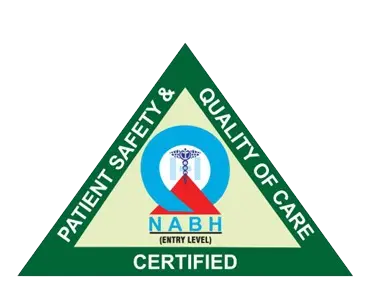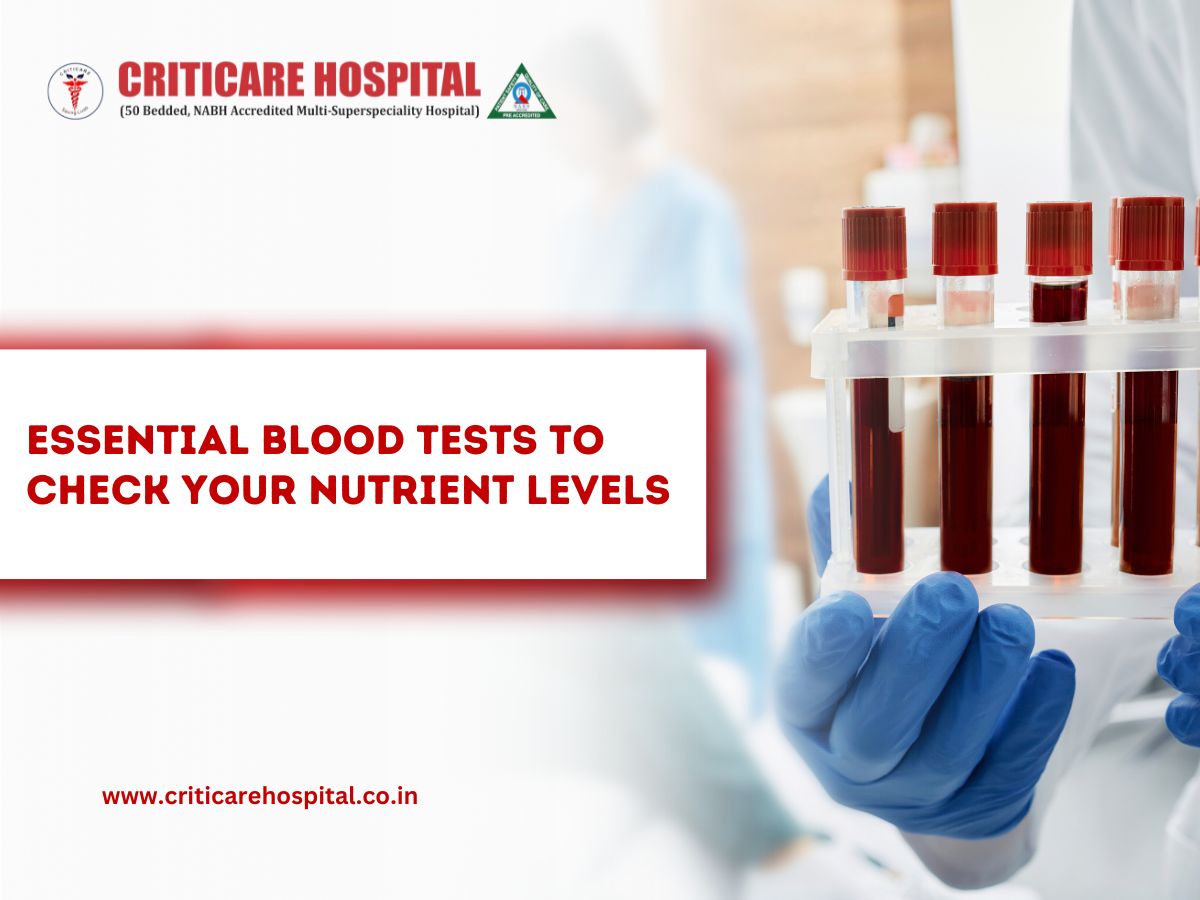Having good health means having the correct nutrient balance required for well-being. These vitamins and minerals, and proteins promote health, vitality, immunity, bones, and the general well-being of a person. Sometimes you may have a vitamin deficiency even if you are eating good food. From this light, one can infer that age, lifestyle, medical condition, or diet of the reader might limit them in such a nutrient as being considered before.
When symptoms appear, activities such as fatigue, hair loss, splitting nails, and occasional illness may be sufficient signs of a deficiency. These deficiencies can often be detected early if discussed between the affected individual and the doctor, followed by blood tests, thereby averting more significant health issues. At Criti Care Hospital Lucknow, we believe in educating patients on the maintenance of perfect nutrient levels for them to keep fit and healthy.
The Reason Nutrient Testing is Important.
Nutrient tests in the blood are not exclusive to those who are not feeling well. We all may have some nutrients whose deficiency could compromise our long-term health. Lack of iron or B12 would produce anaemia, while a deficiency of calcium and vitamin D would make osteoporosis possible.
Patients with chronic diseases or digestive disorders, or those on restricted diets, get considerably more utility from nutrition testing. Knowing the nutrient levels with which you are concerned, your physician would assist you with any changes required in your diet, or with supplements, if they were necessary, and would urge you to avoid any complications.
Major Nutrients Tested in Blood
- Vitamin D: Maintains healthy bones, immunity and muscle activity; lack of vitamin D leads to osteopenia, pain, weakness, fatigue and vulnerability to infections. Blood testing is performed to measure the levels of 25-hydroxy vitamin D, and the doctor may suggest that this level be supplemented, diet, or sunlight exposure.
- Vitamin B12: This vitamin is needed to form nerves, red blood cells, and to create energy; a lack of this vitamin makes a person feel fatigued, experience numbness in the arms, forgetfulness and a change of mood. Vegetarians and older people are the common suspects.
- Iron and Ferritin: Iron transports oxygen in the blood, and the level of ferritin iron is associated with the iron available in the body. The majority are low, and this shows pale skin with anaemia causing weakness and dizziness. Deficiency is tested.
- Calcium: Calcium is the conductor of bones and teeth, muscles, and nerves that help them stay active and healthy. Calcium deficiency causes osteoporosis, fractures and cramping. Early intervention during the initial stages of the disorder, particularly in women, children, and ageing adults, will be assisted by testing.
- Magnesium: Magnesium is important for energy, nerve conduction, muscle health, and heart health. At low levels, cramps can develop, and exhaustion will sneak its way in with irritability and irregular heartbeat. The added advantage of testing is the early detection of deficiencies.
- Zinc: Zinc is essential to immunity, wound healing and taste. Deficiencies of zinc lead to high infection rates, loss of hair, and sluggish wound healing. Testing will permit sufficient zinc consumption for general health.
- Folate (Vitamin B9): Folate is a significant substance in the formation of DNA, red blood cell development, and even fetal development. Lack of this nutrient may lead to anaemia, fatigue and problematic pregnancies. Testing aids in the consideration of the potential necessity of supplementation.
Who Are the Nutrient Blood Tests Indicated For?
Nutrient testing can be of value to practically everybody; however, some groups should be given first consideration. An insufficiency may occur in B12, iron, and zinc in people who are vegetarian or vegan. Folate, iron, and vitamin D are the most important to the pregnant woman. Apart from this, vitamin D, calcium, and B12 levels are more likely to be deficient than normal in the ageing population. In cases where there is a chronic illness, difficulty digesting food, or some form of medication side effect to contend with, they may need regular testing. Early diagnosis warrants timely interventions, diet and lifestyle-wise for better health prospects in the long run.
How the Tests are Done
Nutrient blood tests are not very invasive and are not complicated. A small amount of blood is taken, normally from an arm, and is sent to the laboratory to be checked. Certain tests, such as iron or vitamin D tests, can be done when a person is fasting, whereas other tests can be conducted at any time. The findings tend to take a few days. Doctors analyse the findings and offer suggestions about what is lacking and how to eat, take supplements, or change lifestyles. Follow-up testing can also be prescribed to monitor improvement and to monitor nutrient balance.
Interpreting the Results
A blood sample may reflect concentrations of nutrients that range from normal, low, or high. Any value below hundred would mean weakness, and any value above 100 can prove harmful. These results are interpreted with respect to age, lifestyle, health conditions, or drugs. The management plans to correct the imbalance of nutrients may consist of standards of diet, supplements, explanations, or lifestyle changes, depending on the results. There are continuous follow-ups to curb the onset of complications and to safeguard longevity.
Common Nutrient Deficiency Symptoms
Signs of a nutrient deficiency can, at times, be detected even before getting tested. Typical symptoms include repeated bouts of weariness, recurrent infections, splitting nails, hair thinning, muscle cramps, and delayed wound healing. As well, change of mood, irritability, and loss of concentration are symptoms of B vitamin deficiency or of iron deficiency. Due to the sensitivity of these symptoms and the possibility of diagnosing and confirming them with blood tests, early intervention and prevention of complications in the long term is possible.
Healthy Nutrient Level Maintenance Tips.
The nutrient levels will be maintained with the balance of the diet. Consume vegetables, fruits, whole grains, dairy, low-fat meats and nuts. Incidentally, vitamin D can be synthesised through exposure to sunlight. Restrict processed food, sweets and fatty food. Good sleep and exercise are healthy and assist in the absorption of nutrients and a healthy body. Stress management is also helpful. In certain situations, supplements may be required, but this should be under the care of a physician.
Role of CritiCare Hospital.
Here in CritiCare hospital in Ashiyana Lucknow, we offer full nutrient testing services with precise results and professional advice. Our physicians consider the needs of each person, and prescribe customised diet, supplementation and lifestyle plans. We also provide follow-up testing to check on progression and also to ensure long-term health. We want to inform patients about basic nutrient balance and help them avoid health complications by providing knowledge and tools.
Conclusion
A blood test to monitor the level of nutrients is a very effective and simple method of ensuring good health. Deficiencies can be identified early to avoid serious diseases, enhance energy, boost immunity and promote good health. You may be tired, lose your hair, or always be sick, and blood nutrient testing can tell you something valuable about your health. At CritiCare Hospital, we offer precise testing, individualised advice, and continuous guidance to our patients to achieve a healthy and balanced life. The proactive measures of today are the surest means of preparing your body with the nutrients it will need later on to help it remain vital and healthy.




